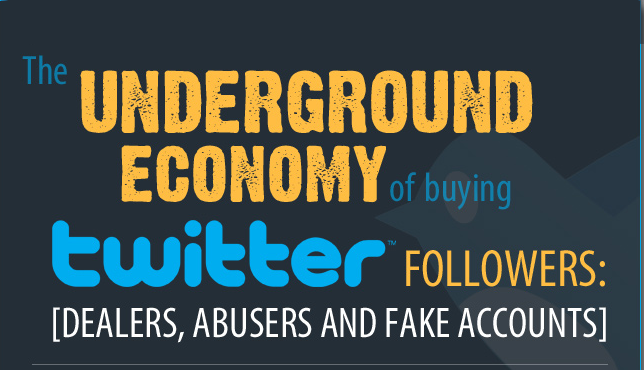
Most of us who spend a lot of time on Twitter know just how difficult it can be to earn and keep a follower. It’s a delicate balance of dispersing engaging, thoughtful tweets without flooding peoples’ timelines with your agenda. Yet, somehow, there are many Twitter users who have enormous followings even though most of their timelines consist of things like cheesy quotes, bad (really bad) photos and blog posts, and the ever-annoying stream of shout-outs.
So what is it about these Twitter mega stars — and I’m not referring to celebrities, athletes, TV personalities, or well-known chefs — that enables them to pull in a massive amount of followers? How exactly are they earning and engaging 50,000-100,000+ people without the clout that goes along with being in the public eye? Well, they’re most likely not gaining followers like you and I do. Many are participating in the underground Twitter economy — a.k.a. the Twitter black market.
Security firm Barracuda Labs went incognito to find out just what goes down on the Twitter follower black market, and the results were quite astounding. Apparently, buying followers is about as easy and time consuming as purchasing a new t-shirt. Currently, there are 20 sellers on eBay and 58 websites selling fake Twitter followers at a bargain price of approximately $18.00 per thousand.
The deal is so good that politicians are even getting in on it. Barracuda Labs discovered a peculiar spike in Mitt Romney’s following, which is currently well over 800,000 followers. In just one day it shot up by 17 percent, a number that’s impossible to generate ethically being that Twitter (claims) that most accounts are only allowed to follow a maximum of 2,000 people total.
There’s no question that having a large following on Twitter provides many perks beyond the obvious clout that it brings. Many public relations, marketing and advertising firms will request Twitter followings from potential clients to calculate the kind of influence these people have. This puts the people and companies that are willing to pay for fake Twitter and Facebook followers/subscribers way ahead of people who play by the rules.
At Culture-ist, we’ve had a hunch about the workings of the underground economy of Twitter and Facebook for quite some time. We also are aware of the myriad games that companies and blogs play to boost their numbers, but we choose to be ethical because we believe the only true way to draw in and KEEP readers is by producing stellar content and by making it clear to our audience that we would never be dishonest with them.
So kudos to Barracuda Labs for bringing this issue into the public eye — we hope it will force Twitter and other social media platforms to crack down on people and companies who think that shortcuts are the way to gain success, and give those of us who simply work hard to earn it a fighting chance to do so.




